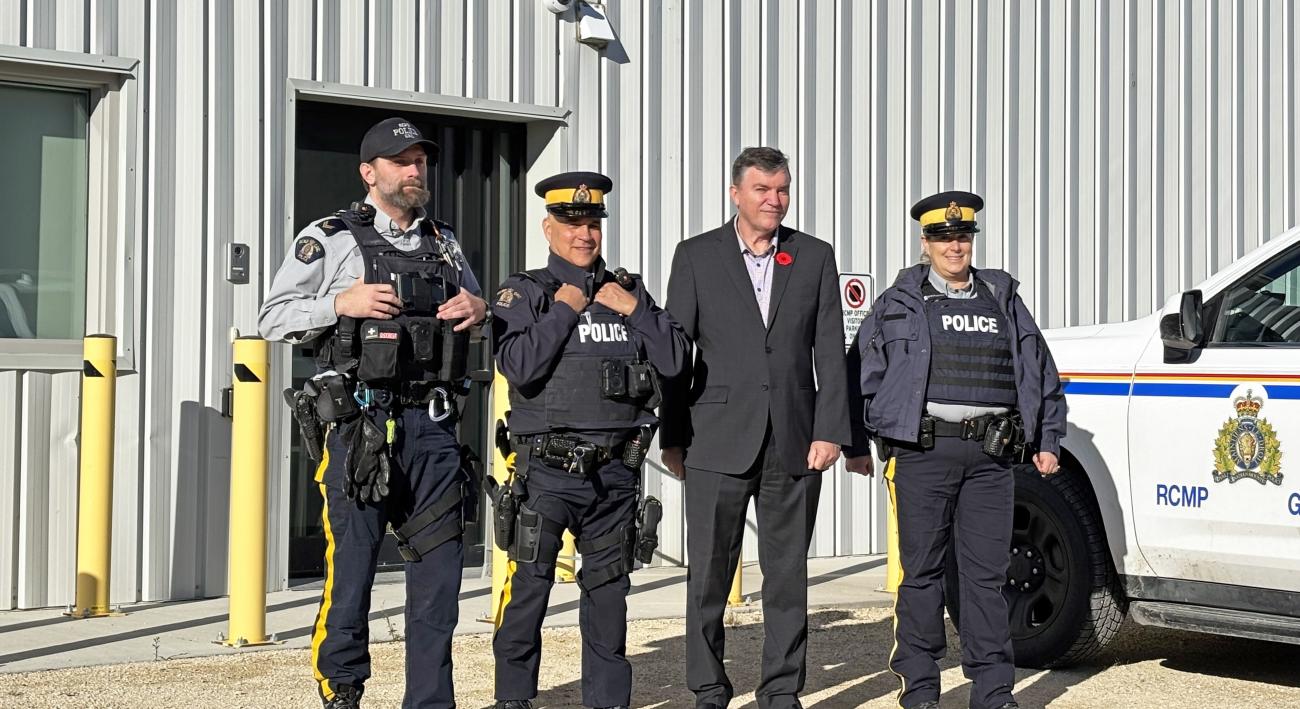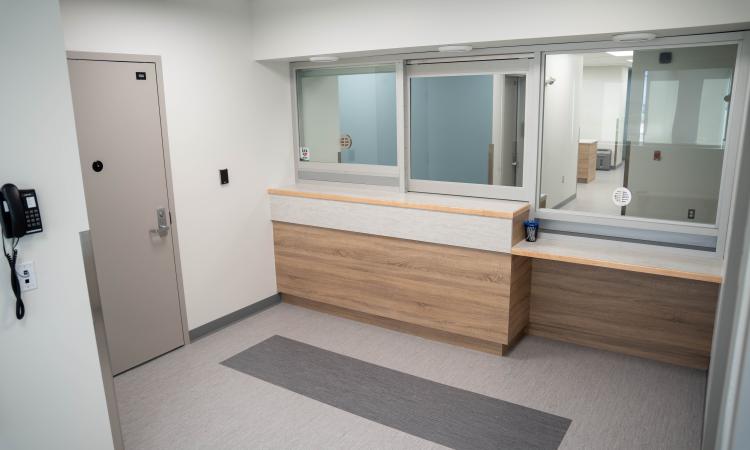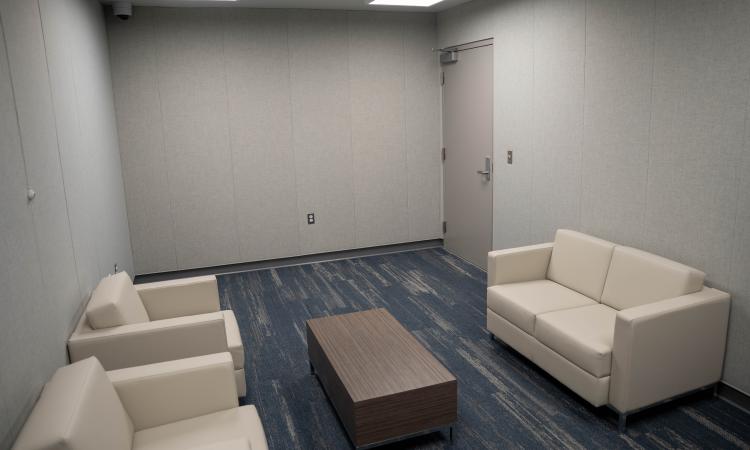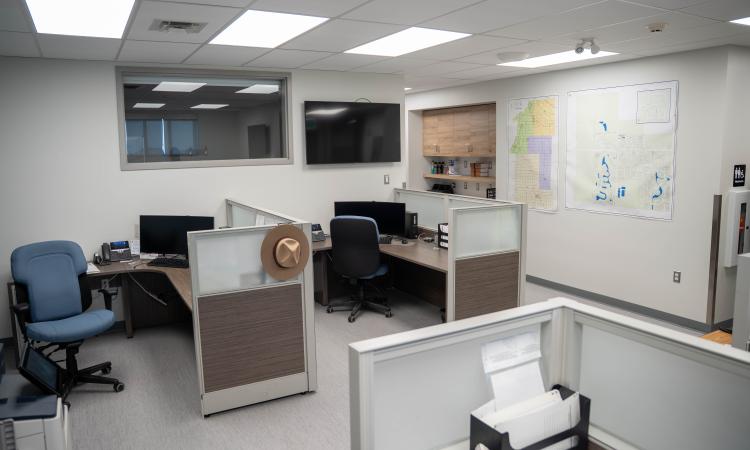On November 3, at 9:00 a.m., the new Niverville RCMP detachment opened for the first time. The office is home to three RCMP constables and one corporal on a full-time basis.
For security reasons, there will be no tour available to the public.
The office is open from 8:00 a.m. to 4:00 p.m., Monday to Friday. Criminal record checks will be available during more limited hours.
The fully equipped detachment has virtually all the same amenities as St. Pierre-Jolys’ has, with the exception of holding cells.
The media was taken behind the scenes for a sneak peak of the new facility, guided by Staff Sargeant Ron Poirier and Corporal Mèlanie Roussel, media relations officer for the RCMP.
The tour began in the only public area of the facility: the foyer. Here, residents can access RCMP administrative staff from behind a glass enclosure. Moving into the secure area, media were introduced to the interview room, or what Poirier calls a “soft room.”
“The soft room is a little more sensitive,” says Poirier. “We can sit down here in a non-police kind of environment. It’s a safe place and also soundproofed so whatever is said can’t get out.”
According to Poirier, the comfortable living-room-type setting of this space is where children and victims of violence may be taken for interview.
“It’s a place to start,” Poirier said. “It’s not your typical desk and two chairs, where there’s a spotlight on you.”
Even so, the room has two discreet video cameras equipped with audio. Across the hall is another closed room where an officer can sit to monitor the conversation in real time or review by playback later.
“Here, the interviewer will meet with the monitor and say, ‘Hey, did you see anything or hear anything?’” says Poirier. “So this is how they can take a little break to determine next steps.”
The soft room isn’t a typical accessory of a rural RCMP office. Even the St. Pierre detachment, which oversees the Niverville location, no longer has a soft room, lost to the expansion of their administrative area.
Police interviews not requiring the sensitivity of a soft room will be performed at the St. Pierre-Jolys detachment.
Past the soft room, a series of desks create space for administrative staff to work. Surveillance monitors line the walls, allowing staff to keep a safe watch on the public entrance.
Julie Allen of Ste. Agathe is the new hire. Working in support services, she will be able to provide bilingual services to the public.
Taking up the rear of the main floor is an area called the bullpen. Here, officers will perform their daily paperwork from a series of cubicles equipped with computers. Large maps of the community, as well as the entire jurisdiction area of the St. Pierre-Jolys detachment, adorn the walls.
Corporal Justin Nichols, who will supervise the constables, has his own personal office.
Across the hallway, behind a locked door, lies the exhibits room.
“When the on-the-road investigator seizes something, they can store it in there,” Poirier says. “They let Justin know and then he moves it down to the main locker where it is secure.”
Next door is the officer tack room where shared supplies, such as firearms and radios, are safely stored.
“This detachment is expected to be able to respond to a critical incident on its own, so whatever equipment [is required] in responding to that. Whatever St. Pierre has, Niverville has here as well.”
On the second level is a large file room for archived paperwork and exhibits. Some of these exhibits, such as DNA results, will be stored for a lifetime.
Next door is an open board room for group meetings. For the use of the officers, there’s a full locker room with showers and two workout rooms to keep them active during in-office hours.
Two patrol cars have been designated for the Niverville detachment.
According to Niverville’s mayor, Myron Dyck, the decision to include the RCMP office in the civic office building was one of practicality. When the building at 329 Bronstone Drive was purchased by town council in 2018, it had far more space than the town needed.
“All this [RCMP] space was designed and built to spec as per their [federal] requirements,” Dyck says. “Based on meeting the needs of emergency services for our community, we saw this as something that was needed, and we’re happy they’re here.”
While November 3 marks the official opening day, Poirier says staff have been working in the office for more than a month now, getting a feel for the facility and working out the kinks.
As to why it has taken so long for the Niverville detachment to open, Poirier says that administrative staff for any RCMP detachment require training which isn’t always available when it’s convenient.
In its entirety, the St. Pierre-Jolys and Niverville officers will oversee much of southeastern Manitoba, excluding Steinbach, which has its own detachment.
According to Poirier, the St. Pierre-Jolys office will generally cover rural areas while the Niverville office will be more Niverville-centric. Still, both offices will complement each other in terms of staffing.
“With only a four-man compliment, the ability [for the Niverville detachment] to provide 24-hour policing isn’t realistic. So there has to be support from St. Pierre and vice versa.”
Currently, around 15 officers are stationed at the St. Pierre-Jolys location.
As for how Niverville residents will directly benefit, Poirier says there will be an obvious RCMP presence that may not have been as clear before.
“They’re going to experience more visibility. From members driving to the office, going to the schools… the restaurants, the rec centre. There’s a police car driving down Main Street every day.”
What residents may not be able to expect, in house, is conversations with an officer in the French language, since being bilingual isn’t a federal requirement in all detachments.
“If someone interacts with a Niverville member and decides they want French service, because it’s their right, we will provide it,” Poirier said. “We’ll have a bilingual member on the phone, over the air, or come in person to deal with that person.”
Historically speaking, Mayor Dyck says that conversations around Niverville-centric policing have been going on for decades. For a while, the presence created by the RCMP officers living in the community was enough, but that changed in recent years.
“What really tripped this was two incidents where there was bodily harm done to two separate individuals,” Dyck says.
New conversations began to take place between council and the St. Pierre-Jolys detachment. At the same time, council explored the idea of creating a private police service, similar to the one in St. Anne. In the end, when it was determined that a location collaboration was possible with the RCMP, the town progressed in that direction.
Based on Niverville’s current municipal contract, four officers have been allotted. That number could increase, says Poirier, if council decides it isn’t enough. That would come with additional costs to the taxpayer, though.
At this stage, Dyck says that it’s a good trial number to start with considering they have the support of the officers from St. Pierre-Jolys detachment to fall back on.





